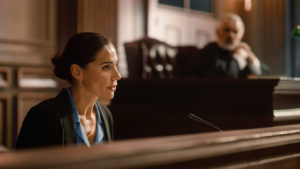
Testifying Advice from the Pros
Here’s what great trial attorneys said they want when examining witnesses in court.
 I took the witness stand last month for the first time since the pandemic. We had been working on our client’s case for nearly two years. The stakes were high.
I took the witness stand last month for the first time since the pandemic. We had been working on our client’s case for nearly two years. The stakes were high.
Answering questions under oath is like no other question-and-answer situation. We answer questions all the time in friendships, at work, at the store. But testifying is not having a pleasant conversation: I found myself thinking about being the most accurate historian, ever. Each word felt significant. And a dozen jurors focused on each statement I made.
After this experience, I gathered insights from great trial attorneys to get a sense of what they want in their witnesses. These are some opinions they shared.
Do not try to win the case.
Treat both sides the same. When you’re a defense witness, do not be aggressive or snarky with the prosecutor. “It makes the witness seem less truthful,” said Michelle Kerin, partner at Portland-based Angeli Law.
Treating both sides the same is what makes a witness credible, said defense attorney John Cline. Witnesses sometimes feel defensive on a prosecutor’s cross-examination, even with innocuous questions. “If the witness calmly acknowledges bad facts, that’s fine, but if the witness becomes defensive and starts hedging, then it turns into a nightmare,” he said.
San Francisco-based Swanson & McNamara partner Attorney Ed Swanson also said that having the same demeanor with both attorneys is essential. “Even if the other side is being accusatory or asking argumentative questions, I want the witness just to recount facts without having an agenda,” he said. “It undermines credibility if they switch their attitude between me and cross.”
It is about the case, not you.
If you are an expert in a field, it is fine to admit what you do not know, or to admit holes in your theories. Expert witnesses often get more concerned with how they will appear professionally than the truth of the matter. Becoming defensive and cagey undermines your credibility.
You control your own testimony.
Witnesses sometimes feel like they don’t have control of what they say or how they respond, feeling like they need to quickly answer the opposing lawyer’s pace and questions. But it’s absolutely fine to slow down, ask questions to be repeated or rephrased, Kerin said. Pauses are good.
She said being calm at all times gives your testimony more credibility, especially when the prosecutor is loud and obnoxious and ends up looking like a clown.
If you do not remember, fine.
Witnesses sometimes have the urge to say something even if they cannot recall the situation clearly. If your memory is not clear, that’s fine. Include in your answer that your memory is not perfect on the matter.
Do not try to predict.
Listen and answer the questions asked as they are asked, without jumping ahead to thinking what might be asked. Witnesses sometimes want to get in front of a question they think is going to be asked. “Have confidence that you don’t need to do the heavy lifting,” Swanson said.
Contact us at [email protected] or 415-905-0462 for a free, private consultation about where to go next.